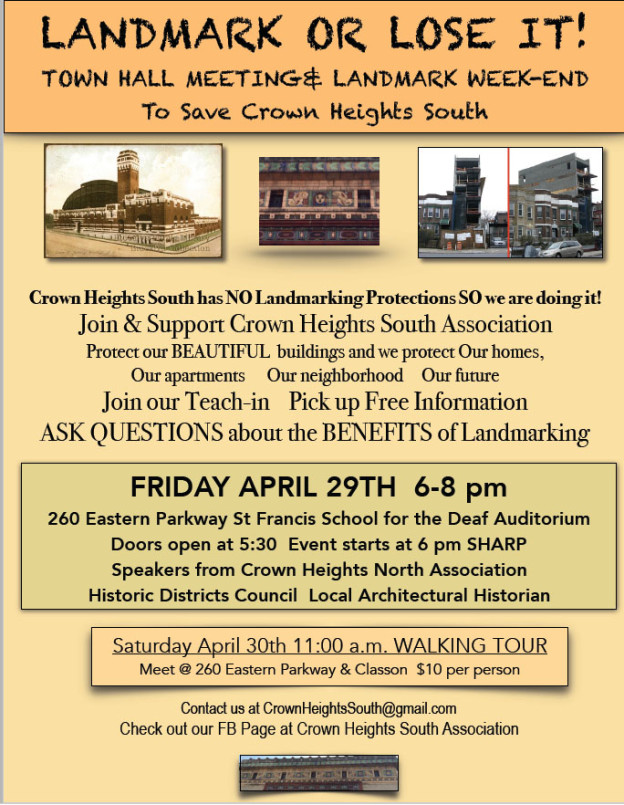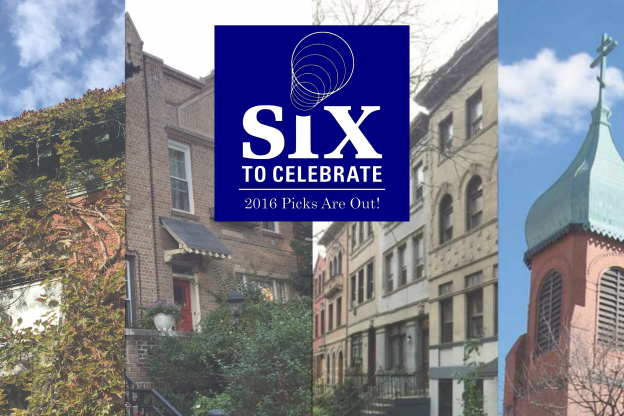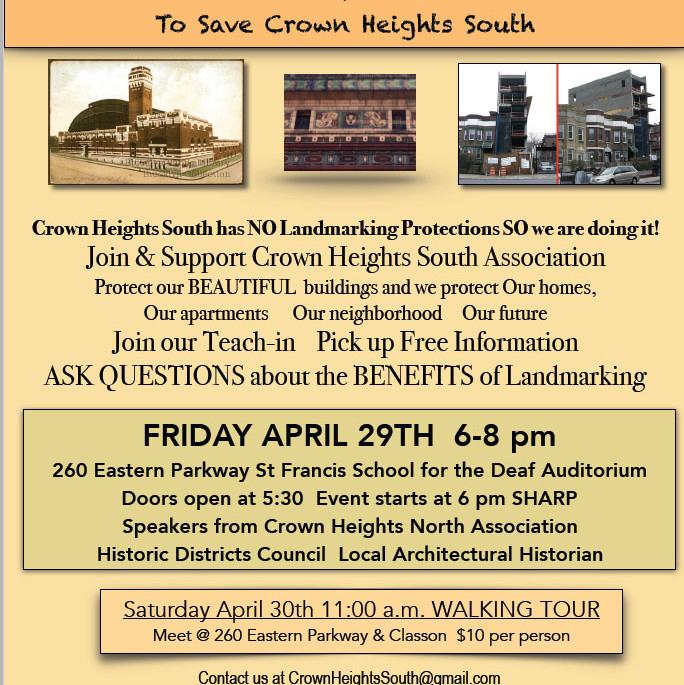
Tag Archives: Crown Heights South

2016 Six to Celebrate Launch Party
Introducing the 2016 Six to Celebrate!
Six to Celebrate annually identifies six historic NYC neighborhoods that merit preservation. These will be priorities for HDC’s advocacy and consultation over a yearlong period.
To learn more about the 2016 Neighborhoods click here
To honor our new Six to Celebrate we will be hosting a party at the South Street Seaport Museum’s Melville Gallery at 213 Water Street on January 28th at 6 pm!
To register for the event click here
Audubon Park, Manhattan

Clay Avenue, The Bronx

Crown Heights South, Brooklyn

East New York, Brooklyn

Richmond Hill, Queens

Yorkville, Manhattan

Support for Six to Celebrate is provided by the New York State Council on the Arts with the support of Governor Andrew Cuomo and the New York State Legislature and by public funds from the New York City Department of Cultural Affairs in partnership with the City Council and New York City Councilmembers Inez Dickens, Daniel Garodnick, Vincent Gentile, Corey Johnson, Ben Kallos, Mark Levine, and Eric Ulrich.

2016 Six to Celebrate Launch Party
Introducing the 2016 Six to Celebrate!
Six to Celebrate annually identifies six historic NYC neighborhoods that merit preservation. These will be priorities for HDC’s advocacy and consultation over a yearlong period.
To honor our new Six to Celebrate we will be hosting a party at the South Street Seaport Museum’s Melelville Gallery at 213 Water Street on January 28th at 6 pm!
Audubon Park, Manhattan

When the Audubon Park Historic District, characterized by large apartment buildings dating to the early 20th century, was designated in 2009, 626-648 West 158th Street was unfortunately left out. These 12 rowhouses were built earlier than the rest of the district, thus representing an earlier phase of development and an alternative vision of how the area should be developed as transit moved northward at the turn of the 20th century. The Riverside Oval Association is compiling a request for evaluation to the Landmarks Preservation Commission (LPC) to expand the historic district to protect this deserving row.
Clay Avenue, The Bronx

The Clay Avenue Historic District encompasses both blockfronts on Clay Avenue between East 165th and 166th Streets in the Morrisania section of the Bronx. The block sits on land that had previously been a horseracing track called Fleetwood Park, and its residential buildings were the earliest to be constructed on the property. In recent decades, economic disinvestment has plagued the block, but local residents are working, under the name Clay Avenue Historic District, to improve public safety, encourage building restoration, and cultivate support for neighborhood beautification.
Crown Heights South, Brooklyn

In response to rapid changes in Crown Heights South and the successful preservation efforts of their neighbors in Crown Heights North, the Crown Heights South Association formed in 2015 to work toward a similar success story. Crown Heights South is characterized by its charming rows of early 20th century houses, stately apartment buildings, and the imposing Bedford Union Armory serving as a grand anchor. The group will survey and document the area, perform community outreach, and compile a request for evaluation to the LPC for landmarks and historic district consideration.
East New York, Brooklyn

Unveiled in 2015, the city’s East New York Community Plan to rezone sections of East New York and Cypress Hills for mandatory affordable housing has left many wondering about the neighborhood’s historic resources. A new group, Preserving East New York, has formed to tackle this issue and to advocate for planning that includes the protection, restoration, and reuse of some of the area’s treasured buildings. The group will identify and highlight endangered structures, build community support for their preservation, and work with the city to protect them.
Richmond Hill, Queens

One of the first planned communities in New York City, Richmond Hill has a strong sense of place that is most noted for its wood-frame, Queen Anne style houses. The Richmond Hill Historical Society has led the effort to preserve portions of the neighborhood for decades, but with renewed energy and supportive elected representatives, a comprehensive survey will be undertaken in 2016 to determine boundaries of a potential historic district. In addition to this survey work, the Society will work to raise awareness of the area’s history and architecture through outreach, programs, and tours.
Yorkville, Manhattan

Formerly an industrial waterfront neighborhood, Yorkville is relatively isolated due to its distance from the Lexington Avenue subway, but change is inevitable with the Second Avenue subway under construction. The area’s historic resources, a mix of townhouses, tenements, high-rise residential towers, and grand institutions, have been well documented by Friends of the Upper East Side Historic Districts. Friends and HDC will advocate for landmark designation and celebrate Yorkville’s immigrant heritage through a series of educational programs, including a spring conference featuring cuisine from some of the area’s storied immigrant establishments.
Support for Six to Celebrate is provided by the New York State Council on the Arts with the support of Governor Andrew Cuomo and the New York State Legislature and by public funds from the New York City Department of Cultural Affairs in partnership with the City Council and New York City Councilmembers Inez Dickens, Daniel Garodnick, Vincent Gentile, Corey Johnson, Ben Kallos, Mark Levine, and Eric Ulrich.
